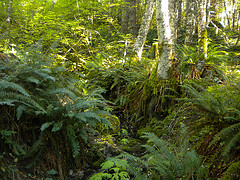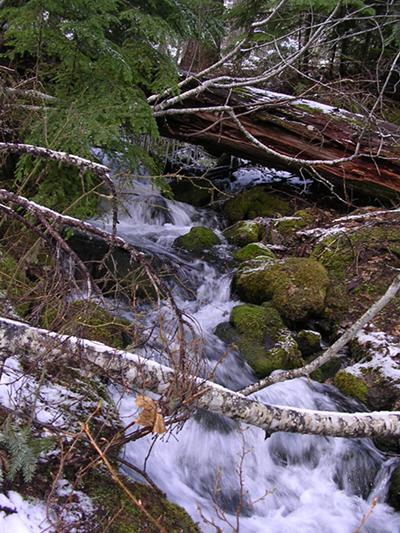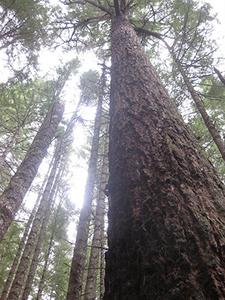 Jazz
Jazz***UPDATE! March 2013*** The Forest Service has resurrected the Jazz Timber Sale with no substantive change to the project. Bark's successful administrative appeal of the Jazz Timber Sale resulted in a withdrawal of the sale in December of 2012 and although we anticipated the agency would likely revive the project, we are surprised to see so little change in the revised proposal to address the ecological concerns that caused the original project to be cancelled. In March of 2013 the Forest Service reissued a revised Environmental Assessment (EA) and decision notice on the Jazz Timber Sale, initiating a new appeal period for the project. We plan to appeal this latest decision on Jazz and oppose the project as it moves forward, in an effort to hold the Forest Service accountable to environmental laws and to protect the Collawash Watershed from 2,000 acres of logging. For the full update, read the article 'Defeated Jazz Timber Sale returns -- Zombie Jazz' linked below.*** The Jazz Timber Sale would log 2,000 acres of forest, throughout 30 square miles of the Collawash River watershed. The Collawash is a tributary to the Clackamas River and is host to the last wild late run of winter coho salmon, making it key spot for the survival of this species. The Collawash is also considered the most geologically unstable area in all of Mt. Hood National Forest, having experienced 7 landslides in a single year alone. Logging loosens soil and increases sediment runoff into streams and rivers, and Bark is concerned these impacts would be magnified on this unstable landscape, and would negatively impact water health and salmon habitat. The Jazz Timber Sale is being billed as restoration, yet would allocate time and money to re-build 12 miles of old roads that have been either actively decommissioned or are naturally reincorporating into the landscape, and would construct 0.4 miles of new road. Additionally, the large size and vast span of Jazz makes it very difficult for the public, let alone the Forest Service, to accurately gauge the environmental effects. Nonetheless, Bark groundtruthers have spent more than 600 hours to survey all proposed Jazz units. Bark successfully stopped the Jazz Timber Sale On December 7, 2012, when we received notice that the Forest Service had withdrawn its decision to approve the Jazz Timber Sale. The Forest Service issued a Decision Notice and Environmental Assessment for the original Jazz Timber Sale on September 7th, 2012. Bark filed an administrative appeal of the decision on Friday, October 19th, challenging the re-opening of 12 miles of previously decommissioned roads for the Jazz Timber Sale and the pre-decisional road work done in anticipation of the Final Decision. We were thrilled to learn that our two-year effort to groundtruth, comment on, organize around, and appeal the Jazz Timber Sale resulted in successfully protecting 2,000 acres in the most geologically unstable watershed in Mt. Hood National Forest. Now, with Zombie Jazz back on the Forest Service docket we are preparing to file another administrative appeal. More...
 The Dalles Watershed Phase II
The Dalles Watershed Phase IIThe Forest Service proposed The Dalles Watershed Phase II project to reduce hazardous fuels and restore hydrologic conditions on 3600 acres within the interior of The Dalles Municipal Watershed .'The Forest Service asserts that this project is needed to protect the drinking watershed of The Dalles from a catastrophic wildfire that may impact future water quality. To that end the project logs 1,352 acres of natural forest and 107 acres of plantation and applies mechanical fuels reduction and/or prescribed burning to 2,300 additional acres. This project is the second phase of a landscape management project that was informed by a collaborative group in which Bark took part but did not always agree with. The area to be logged and burned is not open to the public similar to the Bull Run watershed it has very limited access so Bark cannot get out on the ground in the project area.' More...
 Airstrip Timber Sale
Airstrip Timber Sale***UPDATE! Bark filed a lawsuit September 13th, 2012 challenging the Salem District BLM decision on the Airstrip Timber Sale. You can read the press release and lawsuit as attachments to this page.*** Logging of the Airstrip Timber Sale can begin as early as September! The Airstrip Timber Sale would log 207 acres of naturally regenerated forest just north of the Clackamas River, in the popular recreation area of LaDee Flats. Bark's primary concern with this logging project is the proposed construction of nearly a mile of new road, which would facilitate logging on just 20 acres - forest which happens to be the only area of remnant old growth trees and snags in all of LaDee Flats. It would greatly damage one of the few remaining intact ecosystems among a sea of managed plantations and industrial clearcuts. This backward move by the BLM is one that the ecosystem can no longer afford. The 4,900 foot road, or right-of-way, would log a rare area of old growth and legacy features that is crucial for habitat and biodiversity, includes very steep slopes, and would construct 20 landings, an average of one landing every 250 feet along the length of the road. Each landing could be up to 60 feet by 80 feet in size, and has the equivalent impact of a clearcut. The road would necessitate the felling of two old-growth, six-foot diameter snags, which may provide habitat for 4 different sensitive bat species, listed as species of concern and allow incidental cutting of old growth and designated wildlife trees. Additionally, the BLM would close Road 4610 during active logging, a heavily used road which is one of the only access points to this popular recreation area including the La Dee Flats ORV area. For more information call the Bark office at 503-331-0374. More...












